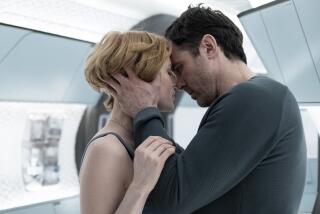Wannabe star’s tale fizzles out
- Share via
“Hollywoodland” is an ambitious film that succeeds only up to a point but no further. This overly derivative motion picture thinks it is doing and saying more than it is. Instead, it ends up as little more than a reasonable facsimile of the real thing, despite a subtle and effective performance by Ben Affleck, of all people.
In some ways that unfulfilled trajectory matches that of “Hollywoodland’s” protagonist, the real-life actor George Reeves, who wants to have Clark Gable’s career but detours into the wasteland of 1950s series television to star in “Adventures of Superman.” When his body is found in the Benedict Canyon home he shared with his fiancee (Robin Tunney) on June 16, 1959, the police call it suicide, but several people have their own reasons for not being sure.
Chief among them is fictional private detective Louis Simo (Adrien Brody), newly on his own after splitting with both his agency and his wife, Laurie (Molly Parker). Simo gets himself hired by Reeves’ mother (Lois Smith) and starts looking into who might have had it in for the 45-year-old actor who’d started his career so promisingly with a featured role in “Gone With the Wind.”
Simo’s investigations, and glimpses of his own messy private life, alternate with flashbacks of what Reeves (Affleck) was up to when he was alive.
As written by Paul Bernbaum and directed by Allen Coulter, both in their theatrical feature debuts, “Hollywoodland” wants to ask all the important questions about the nature of power and celebrity, about the traps and snares of the Hollywood life. It has its eye on prizes like “Chinatown” and “L.A. Confidential,” but its execution falls short.
This kind of push-pull, “yes, but ... “ quality characterizes a lot of what “Hollywoodland” does. The film is a bear for visual accuracy, putting a lot of effort into getting the look of the 1950s just right, but its very authenticity starts to feel oppressive, as if too much of the project’s energy went into sweating those details.
Similarly, though inside-Hollywood scenarios can have an intrinsic watchability, there is a pro forma quality to the way “Hollywoodland” follows its two parallel stories. Perhaps because Brody’s casting as a narcissistic, toothpick-chewing private eye, cocky to a fault, is so on the nose, neither the unfolding of his personal life nor his travails as a private eye completely hold our attention.
What happens to Reeves is of greater interest. A man serious about his acting reduced to “The Adventures of Sir Galahad,” a Saturday matinee serial so low-budget “we all rode the same horse,” Reeves is introduced at Ciro’s celebrity nightspot maneuvering into a photograph to enhance his visibility in the hopes of future employment.
It’s at Ciro’s that he meets the older but still attractive Toni Mannix (the always invaluable Diane Lane), the wife of MGM’s powerful vice president Eddie Mannix (Bob Hoskins).
They begin an archetypal torrid affair, with Toni buying him expensive presents, including a watch with a “Mad About the Boy” inscription cribbed from “Sunset Boulevard.” Reeves genuinely cares about Toni, but he chafes at being a kept man. He’s also uncertain about being cast as Superman, worrying that he’ll “look like a damn fool.” When the show becomes an unexpected success, and Reeves finds that his public is largely younger than 10 years old and male, that is also not particularly to his liking.
Perhaps because his own career has had its unexpected downturns, Affleck is particularly effective as a man simultaneously desperate and full of himself. He captures the sensitivities and insecurities of an actor who is not being taken seriously, someone who is worried to death despite his glib repartee. With its combination of vulnerability and charm, this is perhaps Affleck’s most interesting performance, and certainly one of his best.
Though his part is much smaller, Hoskins does a splendid job as studio fixer Mannix, a thug in Hollywood clothing whose only comment on “Gone With the Wind” is to note “that picture made money.” In some ways Hoskins’ performance is the most real and most grounded one in this picture, the one that shows the direction “Hollywoodland” should have taken if it could. For despite its virtues, “Hollywoodland” never fully succeeds due to the unfortunate air of artificiality that hangs over it. Caught in a netherworld between re-creation and reality, it only sporadically feels like it is actually happening. Director Coulter, nominated four times for Directors Guild of America awards for work on “The Sopranos” and “Sex and the City,” has ended up with something that is hollower than it wants to be, a picture unable to manage the fuller resonances its role models took for granted.
This inability to fully involve us extends to the question of what caused Reeves death. “Hollywoodland” offers three scenarios to choose from, but the mystery becomes less rather than more interesting as the film goes on. The question critic Edmund Wilson famously asked in his attack on detective stories -- “Who Cares Who Killed Roger Ackroyd?” -- works just as well with George Reeves in the title.
*
‘Hollywoodland’
MPAA rating: R for language, some violence and sexual content
A Focus Features release. Director Allen Coulter. Writer Paul Bernbaum. Producers Glenn Williamson. Director of photography Jonathan Freeman. Editor Michael Berenbaum. Production designer Leslie McDonald. Running time: 2 hours, 6 minutes.
In general release.
More to Read
Only good movies
Get the Indie Focus newsletter, Mark Olsen's weekly guide to the world of cinema.
You may occasionally receive promotional content from the Los Angeles Times.








